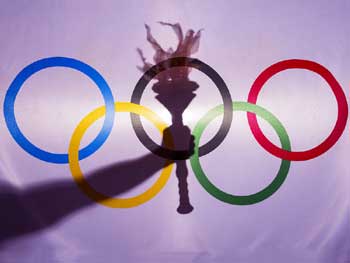
There is something enchanting about the Olympics, even if you are not very interested in sports: Years of training are spent by athletes to give their all and produce a once-in-a-lifetime performance – often within a few seconds. We cry happy tears for the winners, sympathize with the losers, yell at the TV, and high-five strangers. Every two years, we adjust to a different time zone, feel a little bit more patriotic, and get perfect at recognizing flags and national anthems from around the world.
In order to get into the Olympic spirit and the emotions that come with it, we put some facts about the Olympics that will blow your mind – so you have something to delve into while waiting for the next athletic record to be broken (or for the pizza delivery to arrive).
Olympics Facts
The Olympic Games initially took place in the eighth century B.C. in Olympia, Greece. They were held Every Four years for 12 centuries.
Emperor Theodosius I outlawed all pagan festivals in the fourth century A.D., ending the Olympic’s.
Athletic tradition was resurrected about 1500 years later: The First Modern Olympics were held in 1896 in Greece.
The Olympic torch is Lit the Old fashioned way in an Ancient ceremony at the temple of Hera, in Greece, using a Parabolic mirror and Sun rays to kindle the Torch.
Beginning its relay to the host city, Torch Although it is typically carried by runners, it has also travelled by radio signal, boat, aeroplane, horseback, camelback, underwater, and canoe.
Throughout the entire event, both the Olympic flame and the relay torch are meant to burn. Only a backup flame that has also been lit in Greece can Reignite the Flame in the event that it goes out.
The Olympic Games are so called because they were held in the city of Olympia.
“Citius-Altius-Fortius”—“Swifter, Higher, Stronger”—is the Olympic motto.
Together with the official language of the hosting nation, English and French are the official languages of the games.
The five major regions of the world—Africa, the Americas, Asia, Europe, and Oceania—are represented by the Olympic Rings.
Every nation’s flag includes at least one of the six colours: blue, yellow, black, green, red, and white. These colours were chosen for this reason.
Painters, Sculptors, Architects, Writers, and Musicians competed for medals in their respective fields during the Olympic Games from 1912 until 1948.
An Olive branch Wreath was given to Winners of the Ancient Olympics events. Awarding the Gold, Silver and Bronze medals started in the 1904 Olympics.
1912 saw the Last Olympic Gold medals made Entirely out of Gold.
Women have been Allowed to compete in the Olympic’s since 1900.
Only Three modern Olympic Games have been Cancelled. Because of World Wars I (1916) and II (1940, 1944), the Games were cancelled.
Athlete turned actor Johnny Weissmuller won five gold medals in swimming in the 1920s, and he went on to play Tarzan in twelve films.
The 2004 Olympic Summer Games in Athens attracted 202 countries on record.
During the 1936 Berlin Games, Two Japanese pole-vaulters tied for Second place. Rather than resuming competition, they divided the silver and bronze medals in half and fused the two separate portions together, resulting in a half-silver and half-bronze medal for each individual.
The Olympic Games are held in two different formats: summer and winter.
The Summer Olympic’s are held during the Warmer months of the Year and are simply referred to as the Olympics. Conversely, the Winter Olympics take place in the winter.
The Summer games are held Every Leap year while the Winter games are held every two years after a leap year.
The 2012 London Games were the first Olympics in which all participating countries sent female athletes.
The sports of solo synchronised swimming, tug of war, rope climbing, hot air ballooning, duelling pistol, tandem cycling, swimming obstacle race, and plunge for distance are sadly no longer included in the Olympic Games. Fortunately, live pigeon shooting was limited to the 1900 Paris Olympics and was a one-time event.
Baron Pierre de Coubertin, a co-founder of the modern Olympic Games, created the Olympic symbol, whose five rings stand for the world’s five inhabited continents.
The six colours were selected because every country’s flag has at least one of them: blue, yellow, black, green, red, and the white background.
Athletes in ancient Greece competed in their undies with no concerns about funding, safety, or style.
The games used to last for five or six months back then.
Since 1900, women have been able to compete in the Olympics.
The Summer and Winter Olympics were held in the same year from 1924 to 1992. They now rotate every two years on different cycles.
There are just four athletes who have medalled in both the summer and Winter Olympics. Only one of them, Christa Ludinger-Rothenburger, won medals in the same year.
For slightly over two weeks of operations, the Olympic Village at the 2012 London Games needed 165,000 towels.
In addition to the official language of the host nation, English and French are the official languages of the games.
Olympic athlete Johnny Weissmuller, who portrayed Tarzan in twelve motion pictures, was a five-time gold medalist in swimming during the 1920s.
Artists competed in the Olympics from 1912 to 1948, showcasing their skills as painters, sculptors, architects, writers, and musicians seeking medals in their respective disciplines.
Two Japanese pole vaulters tied for second place in the 1936 Berlin Games. Rather than rerunning the competition, they divided the silver and bronze medals in half and joined the two distinct parts to create a medal that was half silver and half bronze for each of them.
At the temple of Hera in Greece, the Olympic torch is lit traditionally. Actresses dressed as Greek priestesses use a parabolic mirror and sunlight to ignite the torch.
There have also been multiple space missions using the Olympic torch that isn’t lit.
Throughout the entire competition, both the Olympic flame and the relay torch are intended to burn. If the flame goes out, the only way to start it again is with the backup flame—which has also been lit in Greece—and never with a regular lighter!
